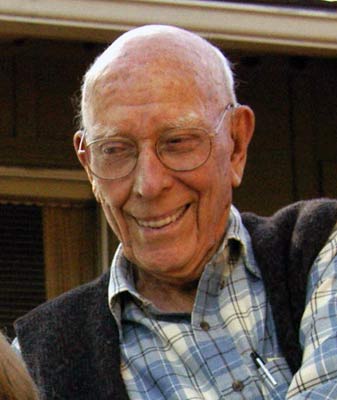Julian Moody 1917-2009
Socrates in Boardroom and Coffeehouse
I like to remember Julian Moody as a gardener. And while it is true he worked for a nursery as a young man, and after World War II, he owned and operated a mail-order flower bulb business, that is not what I mean. Julian was a soul gardener.
Even in the most casual encounters, he cultivated the vision and courage of the people around him-and not just the ones who sought his counsel as a management coach. Everywhere he went, Julian had an elevating influence. A chair at Vices and Spices coffeehouse has been engraved for years, “Julian’s Chair”-which translates, I think, “You always have a place here.”
I met Julian through my wife, Kim, whose grandmother used to hike with Julian’s beloved, Thelma. He spoke at our wedding ceremony 20 years ago. And although I had occasional contact with him in the years following, I really only began to spend regular time with him five years ago. He was 87 at the time. Kim and I began to see him on Sundays to read to him, as his eyesight was failing.

I knew Julian as a strikingly tall man with large hands and a ready, benevolent cheerfulness; a comforting, calm baritone voice; and a be-here-now attentiveness. At the time, I knew next to nothing about his influential career in corporate counseling. He was influential in the expansion during the 1980s and 1990s of Santa Barbara Bank & Trust, for example. I hadn’t yet heard the stories about his time in Europe during WWII, serving in heavy artillery under General Patton, and as a forward scout and stealth photographer. Nor had I yet imagined his scraping for jobs as a boy during the Great Depression, nor his long struggle for self-definition through business failures and deadends. Above all, I had not yet learned what his experiences had taught him about human nature.
Julian listened to books much the way he had read them his whole life: in little quantum gulps. He was never a systematic or cover-to-cover reader, but a “dipper,” as he used to say, dialoguing with books like he dialogued with life, grabbing just enough to chew on, separating the strands, tying them to his experience, assimilating, rereading, and then recapping in his own terms. It was between these gulps, during his recaps, that I began to learn about his life and points of view.
Through all of this, one thing was forever evident about Julian: He had no use for abstract speculation. Whatever we were talking about, he would immediately attempt to apply it to some specific experience. Julian had a pragmatic bent of mind. The truth of a thing was its usefulness, and anything else more a waste of time and attention. No worse expression of contempt toward your pet theory was possible for this thoroughly gentle man than a sigh, a sly smile, and the pronouncement, “Oh-that’s a generality. It has no existence.”
Julian had a way of pinning you down. When your mind was too flighty, he used the occasion of conversation to slow you to what sometimes felt like glacial agony. Bringing a problem to Julian, you felt like a child with a mass of tangled kite string. In impatience and frustration, you had only made matters worse, throwing your hands up in despair of yourself and the problem. He sat with you (only when you were ready and willing) and guided you knot by knot, tugging with tweezers loop by loop.
You often felt richer and freer leaving his counsel, even though he had only made you look more clearly at, say, your job or finances. You thought you deserved endless Saturdays; he pointed to Monday. Thoreau wrote in Walden, “Keep your castles in the air; that’s where they belong. Now put the foundations under them.” That was Julian. He was in the castle foundation business. He believed, and made others believe, in the ever-present possibility of the personal and professional breakthrough.
Two years before his passing, Julian had his backyard completely transformed. The swimming pool which had been there for decades was filled in. The split-level hillside was re-landscaped around a flowing stream, fed by a fountain. The result was his “sanctuary”-a garden that reminded him of the Sierra scenery through which he had backpacked many times. And the heart of it was moving water, which is spirit and song and life. Most of our lives, I think, tend to a kind of pooling. Julian reminded us that while one day we must each flow away-we needn’t wait ’til then to flow now.
There will be a free screening of Socrates in the Boardroom, Julian’s 2007 presentation to the Institute of World Culture, on Sunday, October 11, 7 p.m., at the Marjorie Luke Theatre, 721 East Cota Street. A memorial service will be held the following Sunday, October 18. Please contact Kim, at 967-7263, or kstar137@hotmail.com.



